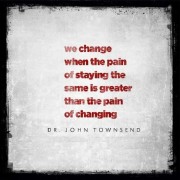Vision (by guest contributor, Dean Robinson)
Preface:
The following is provided by a guest contributor, Dean Robinson. Dean is a principal in the firm Redmans, a family business advisory practice in New South Wales, Australia. Dean and I are part of the same community of professionals and became instant friends at a recent event. Dean’s recent blog post, Vision, hits home as it relates to strategy and execution in family business. I hope you enjoy!
– Kim
=====================================================================================================================================
One of my big criticisms around modern Australian politics is that we no don’t have a clear vision for where Australia is heading as a country. For me, the Hawke, Keating and Howard Governments were all clear on vision. Each government set a future, then trod down the path towards it. Yes, there was some anguish. At times, decisions were made that were unpopular. However, in each of those governments, we had Prime Ministers who saw the bigger picture and understood there would be hiccups along the way. In my opinion, the years since 2007 have been devoid of the big vision.
Which leads me to family business. Unfortunately, too many of them are also unclear on their vision. They unlock the doors each day, take all comers, deal with issues like the Rural Fire Service deals with a bushfire outbreak, then lock it all up at the end of the day, ready to do it all again tomorrow.
In many respects, you can boil this down to three problems:
- Lack of a clear business strategy; or,
- If there is a business strategy, lack of implementation of it; or,
- If there is a business strategy, and it has been implemented, a lack of commitment to it.
A business that lacks a strategy doesn’t know where it is going, an obvious statement I know. However, the number of family businesses that lack a clear and documented business strategy is surprisingly high. This means they’re running all over the place, usually being all things to all people and creating stress for themselves in the process.
If a family business has developed a business strategy, the place where it falls over the most is in the implementation phase. Any client we have worked with on the development of a strategy that says they don’t need our help to implement it has always failed to implement. Without exception. Once the strategy planning day is done, they go back to what they’ve always done, which is generally be reactive. The only thing that works for implementation is accountability. Plenty of school children would not do their homework if they didn’t have to hand it in the next day. The same applies for family business owners.
Finally, if there is a strategy and it has been implemented, any lack of commitment to it from anyone in the management team can de-rail it. Everyone needs to be on board with the direction. If your business strategy is to produce widgets, you gear your factory up to produce more widgets, then find that you’re really not that interested in the widget market after all, you’ve just blown significant resources in the business and potentially taken resources away from parts of the business that work.
My questions to you are:
- Do you have a clear strategy for your family business that you can articulate succinctly and with passion?
- If you have a strategy, what is your process for implementing it and who is holding you accountable?
- If you have a strategy and have implemented it, is anyone undermining the strategy? If so, what are you doing to bring them to account.
This Week’s Tip
Lack of Strategy = lack of direction.
Lack of Direction = business anarchy.
Anarchy – a state of disorder due to absence of non-recognition of authority or other controlling systems (Oxford Dictionary.)











Leave a Reply
Want to join the discussion?Feel free to contribute!